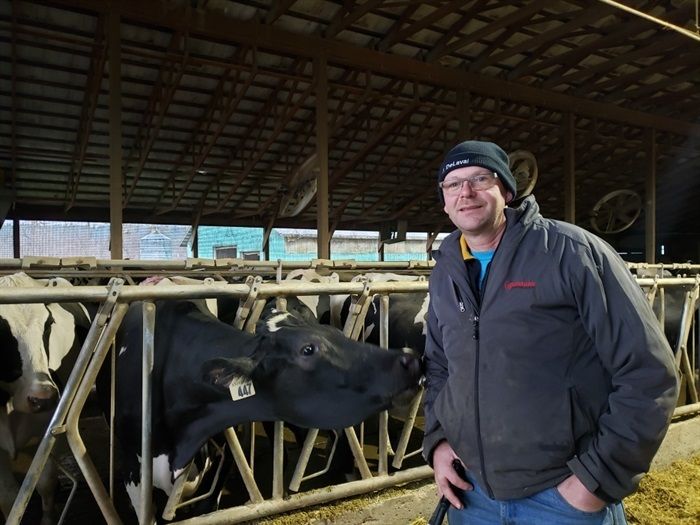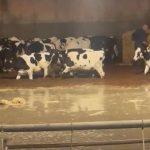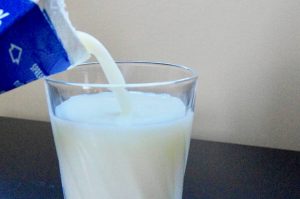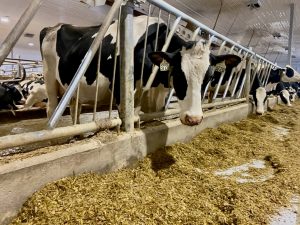
With intermediate road closures, dairy farmers in the Okanagan have nowhere to send their milk to be processed, and as a result, have to dump some of the product.
“Farmers are reimbursed through a national pooling system, but it’s not easy watching your milk go down the drain,” chair of the B.C. dairy association Holger Schwichtenberg said. “It all depends on Highway 3 and 7 being open for the milk trucks to get from the interior to the processing plants around Vancouver. We’re completely dependent on that one road.”
There are smaller milk processing plants in the Interior, including Blackwell Dairy Farm in Kamloops that have taken on the extra workload to help farmers get their milk processed.
“When we were impacted, we took in other farmers’ milk, and overnight we became a community processing plant,” Laura Hunter from Blackwell said. “Our regular processing was about 20,000 litres a week, the week the roads got washed out, we processed 100,000 a week.”
For Blackwell to process the extra product, Hunter gathered more employees overnight and asked staff to work longer hours.
“The amount of work that our staff has done in the last two weeks has been unbelievable how we’ve filled in the gap,” Hunter said. “This is nothing compared to what they are going through in Abbotsford, those farmers are working so hard.”
Hunter is extremely proud of the work done to have the Blackwell processing plant, and for the ability to help neighbouring farmers.
“We’ve been told fluid milk isn’t important, to be bigger you have to do everything, we don’t believe in centralization, we believe in local, and we’ve always been here for the community,” Hunter said. “We’re here, and we’re proud of the job that we’ve been able to do this past week.”
There’s still plenty of uncertainty among Okanagan dairy producers.
“Now it’s up and down, it’s a guessing game right now for what the orders will look like,” Hunter said.
While the unexpected workload increase has created challenges for Blackwell, they have not had to dump their product. However, farmers in the interior haven’t been as lucky.
“Smaller processors in the Okanagan are OK, but most of the milk in B.C. is processed in the lower mainland,” Schwichtenberg said. “When highways are closed there’s no way of getting the milk to the Lower Mainland, so one of the avenues is to ship some of the milk east to processors in Alberta. They are working hard to get the milk to the processors, nobody likes seeing the milk go down the drain.”
Henry Bremer, owner of Cliffview Dairy near Enderby, took his turn dumping milk last weekend.
“Most farmers had to dump their milk over the weekend. They were just getting to about 90% of the milk getting picked up, then we had the fresh wave of rain and road closures on Friday, and they are just picking up the milk in the area now,” Bremer said.
The product that is dumped is put into a manure pit and will be used as fertilizer next spring.
Historically, every area of the province had milk processing plants, however, as farms got bigger, the plants became centralized. Milk now goes between Alberta and the Lower Mainland, Bremer said.
“We don’t have enough processors in the area, we have smaller processors that take about 15% of our milk, and 85% has to go further. When the flood hit and cut everything off, I dumped for one day, a few farmers had to dump a little more,” he said.
Although some milk did go to the east, there were limits on how much product processors could take.
“They will only take milk if there’s a market for it. It’s turning the supply chain around, that’s what makes it so hard for everyone,” Bremer said. “Milk is a very perishable product, and there’s extra attention on the milk industry, because the product is so nutritious, and it can go bad quickly. It’s a very limited timeline to get it to the plant and get it processed.”
Kathy Wikkerink, co-owner of Grassroots farm near Salmon Arm, has only been impacted by shipping product to the coast.
“It’s so complex, and manpower… I’m having a hard time managing with our little hiccups, if we added more where would we store it? There are so many logistic issues,” Wikkerink said.
“For me, the biggest take home is everybody is getting bigger and bigger and it’s slapping us in the face,” Wikkerink said. “Milk is a local product. When the stores were empty because there was no milk, that was a lie, there was milk, all the farms here had milk, but our industry is set up in such a way that a person doesn’t have access to the food until it’s processed, then they can get it back.”

























